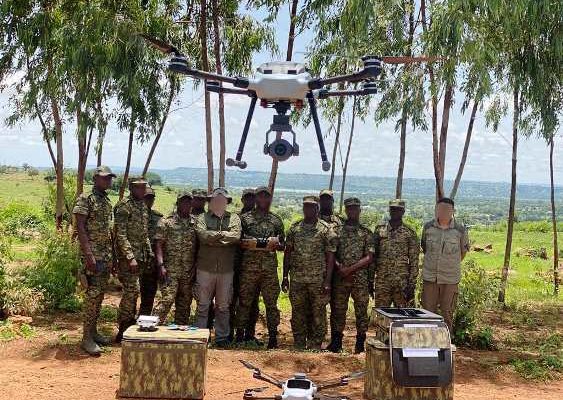By Osasome, C.O
Nigerian Military: Terrorist Drones Are No Match for Counter-Terrorism Efforts
The Nigerian military has dismissed concerns over the drones used by terrorist groups, categorizing them as non-military-grade devices incapable of posing a significant threat. Maj.-Gen. Edward Buba, Director of Defence Media Operations, made this assertion during a recent briefing in Abuja regarding an airstrike incident in Sokoto State.
RELATED: Nigeria Police deploy drones to fight crimes
Buba clarified that while drones are increasingly used in conflicts worldwide, the devices employed by terrorist groups in Nigeria are rudimentary and lack the sophistication required for substantial battlefield impact.
“These are not professional or military-grade drones. These are essentially toys that have been improvised to carry basic payloads. They are ineffective and do not pose any significant threat. Nevertheless, we are taking measures to address their use,” Buba stated.
No Foreign Military Bases in Nigeria
In the same briefing, Buba refuted claims of foreign military bases in Nigeria, labeling rumours of a French base as “mischievous.” He emphasised that Nigeria would not host foreign bases or allow itself to be a staging ground for external conflicts.
Drone Warfare in Africa: A Growing Trend
While Nigeria downplays the immediate threat posed by terrorist drones, the use of drones in African conflicts has been expanding rapidly. Armies, militant factions, and terror groups have increasingly turned to drones as an essential tool in modern warfare.
Military Use of Drones in Africa
Countries such as Mali, Burkina Faso, and Niger have deployed drones in their fight against jihadist groups, leveraging advanced models like Turkey’s Bayraktar TB2 and China’s Wing Loong II for surveillance and offensive operations. Ethiopia, for example, has utilised drones such as the Mohajer-6 and Wing Loong II to gain tactical advantages in its conflicts.
Terrorist and Militant Use of Drones
Terrorist groups like Jama’at Nusrat al-Islam wa al-Muslimeen (JNIM), an Al-Qaeda affiliate, have also adapted drones for attacks. In April, JNIM used drones modified with grenades and mortars to target rival militias in Mali. Such developments highlight the proliferation of drone technology among non-state actors, raising concerns about their potential misuse.
The Role of Drones in Modern Warfare
Drones have become indispensable in military strategy, used for reconnaissance, surveillance, and precision strikes. However, their widespread adoption has sparked debates over ethical implications, civilian casualties, and the risk of advanced drones falling into the hands of terrorist organizations.
Buba’s assurance underscores Nigeria’s efforts to stay ahead of these challenges. While the country continues its counter-terrorism operations, it remains vigilant against the evolving threat of drones, ensuring that rudimentary devices do not disrupt national security.
Key Takeaways
- Terrorist drones in Nigeria are non-military-grade and pose minimal threats.
- The Nigerian government denies the presence of foreign military bases in the country.
- The proliferation of drones in African conflicts underscores their growing role in modern warfare.
- Ongoing measures by Nigeria’s military aim to neutralize emerging threats and maintain national security.
This strategic briefing by the Nigerian military highlights both the current limitations of terrorist capabilities and the broader implications of drone warfare across Africa. As the region grapples with these challenges, robust countermeasures and international cooperation remain essential.





























